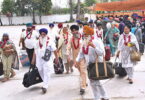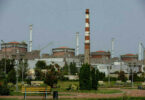Monitoring Desk
A new report from the Fairtrade Foundation calls for more support for international farmers, to safeguard their livelihoods and the future of imported favourites such as coffee, cocoa and bananas. With many retailers and producers creating their own certification programmes rather than exclusively relying on established ones such as FAIRTRADE, it can be difficult to keep track of the policies behind the logos. So what does this mean for shoppers?
“Half of the UK’s food comes from overseas”, says Mike Gidney, CEO of the Fairtrade Foundation, so “we all have a stake in ensuring future generations of farmers… can do so in climate-friendly ways, while earning enough to stay in business and live the sort of life their hard work deserves.”
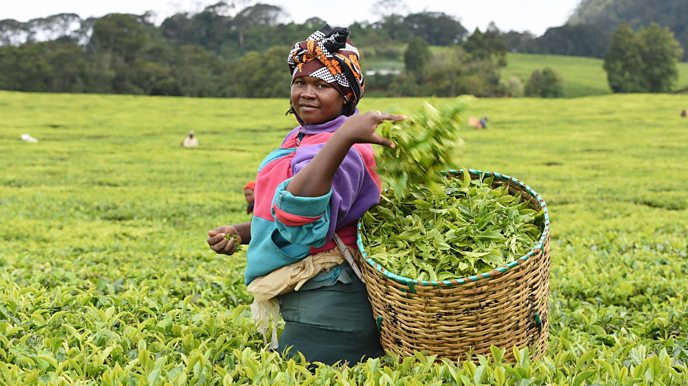
What does fair trade mean?
Three-quarters of Brits “care about fair trade”, according to a Kantar survey for The Grocer. However, there are crucial differences in the definition, depending on the way it’s written.
FAIRTRADE (all capitals) is the logo you’re likely to see most often on food in the UK. The certification system is governed by the global group Fairtrade International and their associates, including the UK’s Fairtrade Foundation. They develop and ensure compliance with internationally agreed standards and guarantee a minimum fair price. They have a rigorous certification approach, including on-site audits by independent inspectors, and require a premium to be paid to farmers to invest in social, economic and environmental projects. 93 percent of UK shoppers recognise the logo, which certifies a product, not an organisation. When the logo is accompanied by an arrow, there may be more information about the ingredients and sourcing methods on the back of the packet.
Fair Trade (two words, capital F, capital T) describes companies following the 10 principles of Fair Trade. The World Fair Trade Organisation (WFTO), a network of Fair Trading businesses, monitors these companies, ensuring the principles are “implemented in the supply chain and practices of the organisation”. As opposed to Fairtrade International, it verifies companies rather than commodities. For example, WFTO can certify the coffee company rather than the coffee bean farm. “Companies are checked by third-party audits and through peer visits by other members”, they say.
Alternative spellings, such as fair-trade, fairtrade and FairTrade, are not legally protected, but if they are accompanied by a logo you may be able to check the conditions of the certification online. Any logo on products in the UK needs to be “verifiably certified” on behalf of an issuing body, according to the Department for Environment, Food and Rural Affairs.
A number of third-party accrediting bodies, including Rainforest Alliance, share some of the same goals as Fairtrade International and follow fair trade principals. While primarily certifying for environmental factors, Rainforest Alliance also sees social and economic improvement “as inseparable elements of the broader goal of sustainability”, and requires “farmers to pay the legal minimum wage while making clear progress towards a living wage”.
Many supermarkets have made sustainability commitments for their own-brand products, including Lidl, Marks & Spencers, Co-op, Waitrose and Tesco. You can research the commitments of supermarkets on their websites.
Which foods do you see certifications on most often?
In the UK, more than 4,500 food and non-food products carry the FAIRTRADE logo, including teas, cocoa, chocolate bars, sugars and wine. But bananas are the most visible product, followed by coffee and chocolate, according to the Fairtrade Foundation.
Certified single-ingredient foods are 100 percent FAIRTRADE, while products containing more than one ingredient, such as a chocolate bar, must show that 20-50 percent of the product’s dry weight is from a FAIRTRADE farm.
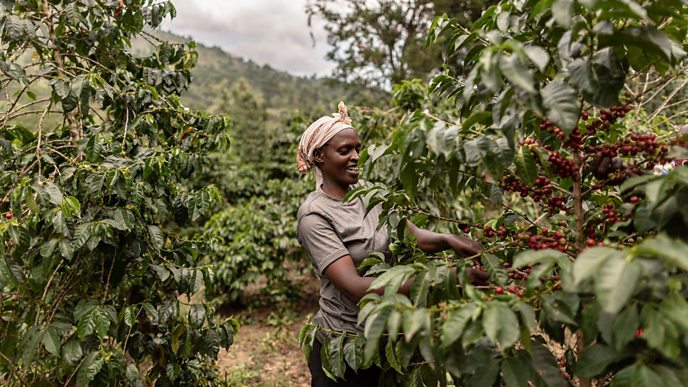
The price of coffee and cocoa for farmers is unstable and can be low. The global market price for arabica coffee beans, which account for an estimated 70 percent of global coffee production, often falls below Fairtrade International’s minimum price of US$1.40 per pound of beans. Due to poor prospects, fewer young people are farming in these industries, according to David Taylor, Policy Manager for the Fairtrade Foundation. The average age of a cocoa farmer in West Africa is over 50, for example.
When prices are low, the Fairtrade Foundation argues “there is neither the incentive nor resources to invest in good maintenance of farms by applying fertilisers and pesticides or replacing old trees…. When prices fall below the costs of production, farmers struggle to put adequate food on the table and pay medical bills and school fees.” With limited options, farmers may end up “abandoning their land or destroying forests and wildlife habitat by clearing land for monoculture” (only producing one crop), according to the Rainforest Alliance.
Certifications such as FAIRTRADE and Rainforest Alliance also support farmers in protecting the environment, ban forced/child labour and promote community development. Approximately 2.1 million children in West Africa “still do the dangerous and physically taxing work of harvesting cocoa”, according to a 2016 report. There are similar issues with coffee labour.
Paying farmers a fair wage doesn’t have to mean a price hike for the consumer, according to the Fairtrade Foundation. They give the example of a non-fairtrade £1 chocolate bar, which they say might see about 6p ending up in the cocoa producer’s pocket, around 40p going to the chocolate company, 35p to the retailer and the remaining 19p being divided between other businesses in the supply chain. Buying fairly traded chocolate “is not about asking you to pay a higher price, but giving cocoa producers a bigger proportion of the price you already pay”, they say. Of course, a more expensive chocolate bar doesn’t always mean the cocoa farmer is paid more.
Some coffee and chocolate businesses use third-party certification, such as Costa Coffee sourcing its beans and hot chocolate from Rainforest Alliance-certified farms and Maltesers aiming to use only FAIRTRADE cocoa. Others, particularly chocolate companies, have developed their own verification programs, such as Cocoa Life (the scheme by Mondelēz, owner of Cadbury), and Cocoa Plan, founded by Nestlé and the Lindt Cocoa Foundation. All say they aim to improve the environmental, social and economic prospects for the six million people who make cocoa their livelihood.
You might see the UTZ certification logo on products containing cocoa and coffee (as well as tea). UTZ has now merged with Rainforest Alliance.
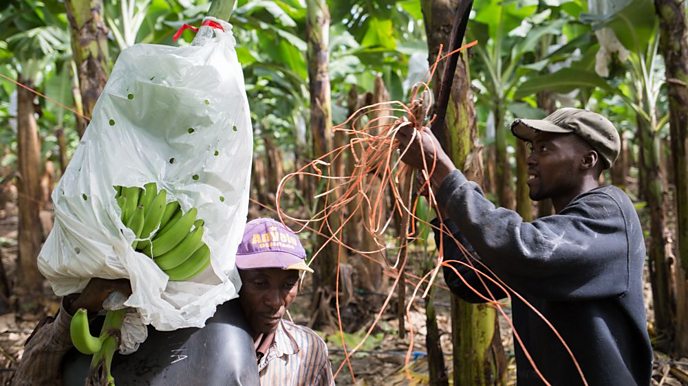
“Adverse climate conditions will trigger a drastic decline in banana yields in 10 countries”, according to the Fairtrade Foundation report, and “we can’t expect [farmers] to tackle the climate emergency if we won’t ensure they earn a decent income”, says Gidney.
But “reports about problems in the banana industry often highlight the woefully poor situation of workers: low wages, precarious employment, restrictions on the right to organise themselves and the handling of unhealthy and environmentally hazardous chemicals without adequate protection, to name a few”, says the Fairtrade Foundation. Both FAIRTRADE and the Rainforest Alliance strictly limit the use of pesticides, and some are banned.
A third of bananas sold in the UK are certified FAIRTRADE. This means farmers are guaranteed the minimum fair price in their region for produce, and support is available for farmer/worker organisations and representation, enabling them to negotiate with management and progress towards living wage benchmarks.
A number of retailers, including Sainsburys, Waitrose, Co-op and Ocado, say all the bananas they sell are FAIRTRADE. Others, such as Aldi, Lidl, Morrisons and Tesco, also source bananas from FAIRTRADE or Rainforest Alliance farms.
Why isn’t all food ‘fair trade’?
The Fairtrade Foundation certifies products that adhere to international standards. But standards aren’t set for all foods, although producers can become certified after lengthy consultation periods and an established market need, according to Fairtrade Foundation’s Policy Manager David Taylor..
The majority of farmers certified FAIRTRADE are the “most disadvantaged producers in the world”. Producers in many locations can become certified, explains Taylor. However, many countries, including the UK, already have laws to protect producers and workers from issues faced by farmers in countries where FAIRTRADE usually operates.
But just because a product is uncertified doesn’t necessarily mean it’s unfairly traded. Some companies choose to buy directly from a producer, managing the relationship, price, quality, sustainability requirements and transparency themselves. Direct trade can allow for a positive partnership, but without certification and auditing, you have to take them at their word and do your research, according to Taylor.
The quickest way to identify fairly traded imported products, without investigating brands and the commodity market price, is with accreditation logos. “Ideally we would live in a world where FAIRTRADE doesn’t need to exist, but we don’t”, says Taylor.
Courtesy: BBC




